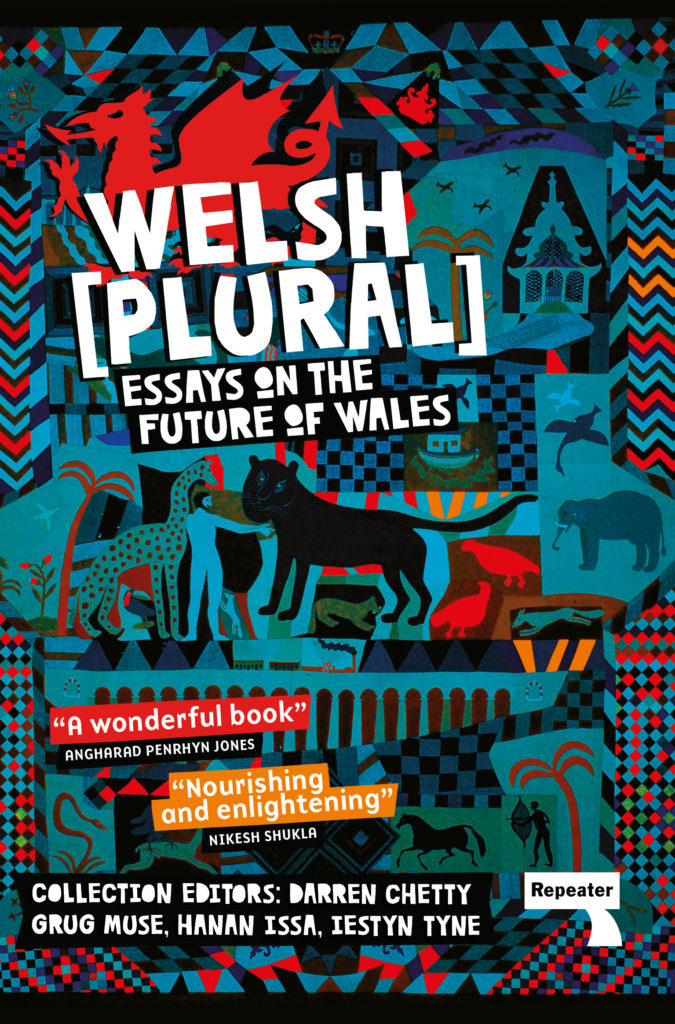Edited by Darren Chetty, Grug Muse, Hanan Issa and Iestyn Tyne, ‘Welsh (Plural): Essays on the Future of Wales’ sees some of the foremost current Welsh writers look beyond the clichés and binaries that shape thinking about Wales and Welshness. Helia Phoenix reviews.

What does it mean to imagine Wales and “The Welsh” as something both distinct and inclusive?
This was the challenge issued to the 19 folks brave enough to explore their many and varying notions of Welsh and Welshness for this anthology. The book was born from discussions amongst the editors about the lack of visibility of Welsh identities and issues in the UK book industry, when compared against the stronger brands of Scottish or Irish writing. (You could probably use this same comparison for anything Welsh when compared to our Celtic neighbours). Ireland and Scotland both have larger populations, a more vocal and present national media. They have a larger, more embedded “cultural voice” that speaks for them before they even need open their mouths. But go somewhere abroad — and ask about the Welsh, or notions of Welshness — and you’ll probably get silence. We’ve been quiet, up until now, it seems.
The essays cover a number of subjects: we get some potted histories at the start, a useful introduction that gives an overview of the complicated relationship with England, and also places Wales in the world from a colonial viewpoint (many of the pieces were written around the time of the BLM protests and movement during the pandemic).
Other pieces cover a variety of additional subjects, some on long-held bones of contention amongst the Welsh: our history, our place in the world, our language, our communities, our farming history, and our landscape.
As you might imagine given the subject matter, the book is a challenging read. It’s not so much the academic research (though the book is densely packed with this in parts). It’s more the individual stories — nearly every single essay has a personal account of someone experiencing racism, xenophobia, homophobia, or prejudice in some way — often as children or while they were growing up in different places and in different times across the whole of Wales. It’s painful to read those pieces and witness those wounds, many of which are taking a lifetime to heal.
Regardless of those kinds of details, having fresh perspectives on “Welshness” is vital to challenge stereotypes and acknowledge and accept the reality of “what Wales is”. We need more conversations with people who have multiple cultural identities, people who negotiate the space of Welshness when they’re black, or Muslim, or queer, or who challenge the idea of what “typical Welsh” might look like, or “be” like (see Hanan Issa’s ‘Have You Heard The One About The Niqabi On The Bus’).
The essays are also about the experiences of immigrants, of émigrés, of the limitations of regional accents, the experience of the Welsh farming community as it faces an uncertain future, and the constant and seemingly endless infighting amongst different parts of Wales. Just where can you find the most authentic — the most real — version of Wales, nowadays?
The answer, of course, is nowhere. There is no more “real” version of Wales as there is some kind of essential spirit that can only be found in “real” Welsh people. There are only people, and this is the land they live in. Like anything, cultural identity is constantly shifting, changing, and no doubt the publication of this book and releasing these stories into the ether will continue moving the boundaries and progressing “our” narrative.
There are also some moments of levity. I enjoyed playing Gary Raymond’s ‘Being a Welsh Novelist: Choose your Destiny Adventure Game’, and the various discussions of regional accents (like Andy Welch’s ‘Rhyl Talk’). The book even moves into deconstruction of notions of tradition within Welsh music, specifically looking at the harp (the national instrument of Wales) through Cerys Hafana’s ‘A Tradition of Change’ (which was one of my two favourite pieces in the collection). My other favourite piece was the closing essay, Rabab Gazoul’s ‘Words That Scatter / How Are We To Heal’.
If the essays have anything in common, it’s their dreams for the future. They all separately — but in unison — dream of a Wales that acknowledges and celebrates its past (and apologises for parts of it, where appropriate), but isn’t confined or trapped there. They envisage a world where diversity and inclusion aren’t just words jammed into the title of some report document, but real ontological states. They want more power in the hands of the people — from more community-run public spaces to a national press and media that truly represents the “Welsh” (whoever and whatever we/they are).
Although obviously the book is freshly minted and hot off the printing press, reading the essays was a curious experience given the time they were written. The immensely uncertain and difficult period in the middle of the pandemic obviously raised big questions for a lot of writers, as they wrote while under the confinement of Covid lockdown regulations, which differed across the UK. These tensions brought back to life the ongoing politics of the historical relationship between Wales and England. I imagine this brought a slightly different flavour to some of the articles than if they’d been written two years before (or if they were being written now).
Regardless of this minor quirk, it’s a vital read for anyone interested in notions of cultural identity (Welsh or otherwise), and a potent call to action for those looking to make our world a better place.
*
Published by Repeater Books, ‘Welsh (Plural): Essays on the Future of Wales’ is out now and available here (£12.08).
Darren Chetty, Cerys Hafana, Grug Muse and Andy Welch will read from and discuss ‘Welsh (Plural)’ as part of our line up for this year’s Camp Good Life.